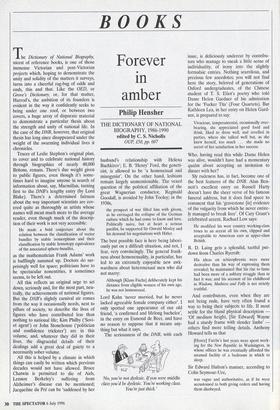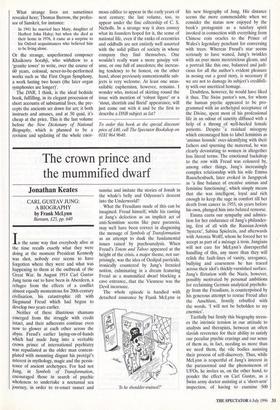BOOKS
Forever in amber
Philip Hensher
THE DICTIONARY OF NATIONAL BIOGRAPHY, 1986-1990 edited by C. S. Nicholls OUP, 450, pp. 607
The Dictionary of National Biography, nicest of reference books, is one of those immense Victorian and post-Victorian projects which, hoping to demonstrate the unity and solidity of the matters it surveys, turns into a cheerful rag-bag of odds and ends, this and that. Like the OED, or Grove's Dictionary, or, for that matter, Harrod's, the ambition of its founders is evident in the way it confidently seeks to bring under one roof, or between two covers, a huge array of disparate material to demonstrate a particular thesis about the strength and unity of national life. In the case of the DNB, however, that original thesis has long since disappeared under the weight of the swarming individual lives it chronicles.
Traces of Leslie Stephen's original plan, to cover and to celebrate national history through biographies of nearly 40,000 Britons, remain. There's due weight given to public figures, even though it's some- times hard to imagine anyone in search of information about, say, Macmillan, turning first to the DNB's lengthy entry (by Lord Blake). There's a determined fairness about the way important scientists are cov- ered quite as thoroughly as artists whose names will mean much more to the average reader, even though much of the descrip- tion of their work is not very accessible:
He made a bold conjecture about the relation between the classification of vector bundles by stable isomorphism and their classification by stable homotopy equivalence of the associated sphere-bundles,
as the mathematician Frank Adams' work is bafflingly summed up. Doctors do sur- prisingly well for space; politicians have to be spectacular nonentities, it sometimes seems, to be left out.
All this reflects an original urge to set down, seriously and, for the most part, neu- trally, the achievements of national figures. But the DNB's slightly carnival air comes from the way it occasionally needs, next to pillars of society, to describe the lives of figures who have contributed less than nothing to national life; Kim Philby ('Sovi- et agent') or John Stonehouse ('politician and confidence trickster') are in this volume, and, whatever they did in their lives, the disgraceful details of their dealings add a great deal of gaiety to a necessarily sober volume.
All this is helped by a climate in which things can easily be written which previous decades would not have allowed. Bruce Chatwin is permitted to die of Aids, Lennox Berkeley's suffering from Alzheimer's disease can be mentioned; Jacqueline du Pre can be 'saddened by her husband's relationship with Helena Bachkirev'; E. B. 'Henry' Ford, the geneti- cist, is allowed to be 'a homosexual and misogynist'. On the other hand, lesbians remain largely unmentionable. The vexed question of the political affiliation of the great Wagnerian conductor, Reginald Goodall, is avoided by John Tooley; in the 1930s,
the prospect of war filled him with gloom, as he envisaged the collapse of the German culture which he had come to know and love. Politically naive, but at heart a serious pacifist, he supported Sir Oswald Mosley and his demand for negotiations with Hitler.
The best possible face is here being labori- ously put on a difficult situation, and not, I fear, very convincingly. The general frank- ness about homosexuality, in particular, has led to an extremely enjoyable new awk- wardness about heterosexual men who did not marry:
Although [Klaus Fuchs] deliberately kept his distance from eligible women of his own age, he was not homosexual.
Lord Kahn 'never married, but he never lacked agreeable female company either'. I only spotted one appearance of our old friend, 'a confirmed and lifelong bachelor', in the entry on Esmond de Beer, and have no reason to suppose that it means any- thing but what it says.
The seriousness of the. DNB, with each No, you're not dyslexic. If you were middle class you'd be dyslexic. You're working class. You're just thick' issue, is deliciously undercut by contribu- tors who manage to sneak a little sense of individuality, of irony into the slightly formulaic entries. Nothing scurrilous, and precious few anecdotes; you will not find here the story, beloved of generations of Oxford undergraduates, of the Chinese student of T. S. Eliot's poetry who told Dame Helen Gardner of his admiration for the Tucker Tits' (Four Quartets). But Kathleen Lea, in her entry on Helen Gard- ner, is prepared to say:
Vivacious, temperamental, occasionally over- bearing, she appreciated good food and drink, liked to dress well, and revelled in parties, where she talked well but, as she knew herself, too much ... she made no secret of her satisfaction in her success.
Who, having read this while Dame Helen was alive, wouldn't have had a momentary qualm about accepting an invitation to dinner with her?
Sly rudeness has, in fact, become one of the best features of the DNB. Alan Ben- nett's excellent entry on Russell Harty doesn't have the sheer verve of his famous funeral address, but it does find space to comment that his 'gravestone [is] evidence of the vulgarity from which he never entire- ly managed to break free'. Of Cary Grant's celebrated accent, Rachael Low says:
He modified his west country working-class tones to an accent all his own, clipped and acceptable to American ears as upper-class British.
R. D. Laing gets a splendid, tactful put- down from Charles Rycroft:
His ideas on schizophrenia were more derivative than his way of expressing them revealed; he maintained that his rise to fame had been more of a solitary struggle than in fact it was; and his account of his childhood in Wisdom, Madness and Folly is not strictly truthful.
And contributors, even when they are not being rude, have very often found a way to bring their subjects to life. If most settle for the bland physical description 'Of medium height, [Sir Edward] Wayne had a sturdy frame with slender limbs' others find more telling details. Anthony Howard tells us that
[Henry] Fairlie's last years were spent work- ing for the New Republic in Washington, in whose offices he was eventually afforded the unusual facility of a bedroom in which to sleep.
Sir Edward Hulton's manner, according to Colin Seymour-Ure,
was vague and authoritative, as if he were accustomed to both giving orders and having them disobeyed.
What strange lives are sometimes revealed here; Thomas Burrow, the profes- sor of Sanskrit, for instance: In 1941 he married Inez Mary, daughter of Herbert John Haley; but when she died at their home in 1976, it came as a surprise to his Oxford acquaintances who believed him to be living alone.
Or the strange, unperformed composer Khaikosru Sorabji, who withdrew to a `granite tower' to write, over the course of 60 years, colossal, never-to-be-performed works such as 'the First Organ Symphony, a work lasting two hours (the later organ symphonies are longer)'.
The DNB, I think, is the ideal bedside book, fulfilling, in its elegant procession of short accounts of substantial lives, the pre- cepts the ancients set down for art; it both instructs and amuses, and at 50 quid, it's cheap at the price. This is the last volume before the New Dictionary of National Biography, which is planned to be a revision and updating of the whole enor- mous edifice to appear in the early years of next century; the last volume, too, to appear under the fine editorship of C. S. Nicholls. In a strange way it does convey what its founders hoped for it, the sense of national life, even if the ranks of eccentrics and oddballs are not entirely well assorted with the solid pillars of society in whose company they find themselves. One wouldn't really want a more gossipy vol- ume, or one full of anecdotes; the increas- ing tendency to be honest, on the other hand, about previously unmentionable sub- jects is very welcome. At least one unas- sailable euphemism, however, remains. I wonder who, instead of skirting round the issue with mention of 'robust figure' or a `stout, shortish and florid' appearance, will just come out with it and be the first to describe a DNB subject as fat?
To order this book at the special discount price of £40, call The Spectator Bookshop on 0181 964 9640.



























































 Previous page
Previous page